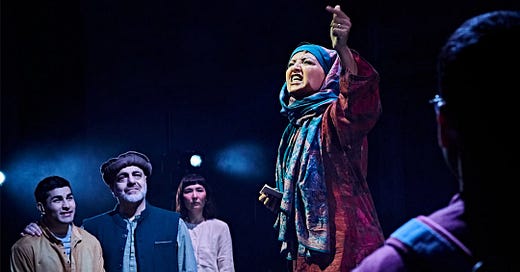The Boy With Two Hearts @ National Theatre, London
Doing what theatre does best. Exceptional creativity, storytelling and engagement which makes you think and stand in solidarity with refugees.
Adapted from the life story of Hamed and Hassam Amiri, we follow an ordinary Afghan family through a traumatic dislocation from all that is familiar, comfortable and safe into a journey to save their lives. It was one of the most gripping plays I’ve ever seen as we are fully immersed into the Amiri family journey. The stage is a simple one with many props, overhung with rows of shirts and uses a balcony and lighting to create the sense of movement and journey.
During the rise of the Taliban, Fariba Amiri speaks out about the treatment of girls and women in her local community. This leads to a death threat being issued against her. But this is a loving family, her husband Mohammed and football mad sons (Hessam, Hamed and Hussein) are totally for her, and they sell everything they own to raise enough money to flee. Which means putting their lives and their cash in the hands of people handlers, as well as avoiding Calais. Terrifyingly a Taliban gunman comes to their home as Fariba and the children hide on the roof of their home, and Mohammed tries to put them off. Mohammed appears to have been shot, we don’t know what happens to him — then he reappears beaten and bruised.
We go with them as they squash into secret spaces in false car boots and lorries, run out of oxygen, freeze in a safe house flat in Russia (being mugged of their money along the way) and try to live in life in camps, always trying to move forward to better medical care for Hussein, who is the boy with two hearts — he has an underlying long term medical condition.
There are terrifying moments as the family walk and run arduous distances and Hussein struggles. There are gripping moments when it looks like the family won’t manage to stay together. However, their hopefulness and love for each other keeps them going — they dream of the food they will eat when they reach the UK; they miss their shared seated meals together; the boys keep playing football and even find a bike to ride; Fariba shields her children from guns and the strange comments of people handlers. Mohammed keeps making dad jokes and they celebrate as they can — I love Fariba’s squirming as Mohammed launches into another cheeky dad joke. All the while adjusting to culture, languages, dislocation and subtle prejudices such as Mohammed can sit in the front of a car on a journey because he doesn’t look like an Afghan, whilst everyone else squashes away. So much of their journey too is dependent on knowing the right people - such as when the people handler undergoes remorse and helps them out.
Poignantly a little girl (shown as a shadow puppet with a pair of rubber boots) chats to them and talks about her sister who was taken away by people handlers. The vulnerability of refugees and especially women and children come through.
Best of all, this is a multi-language production with singing in Farsi throughout by Elaha Soroor; a script in both English and Farsi (often with English subtitles), and sometimes other languages as we go to European countries. What comes through is the hard work refugees go through navigating languages, cultures, systems in many languages and relying on translation.
Navigating one last journey on a train (avoiding the horrible boats) and multiple IDs involving false passports, the Amiri family reaches the UK. We then journey with them through the process of healing Hussein’s heart — he has a pacemaker put in place, and eventually comes to London for specialist treatment. Mohammed and Fariba rely on their children for translation. Hussein succeeds academically but decides ultimately not to have his heart replaced — and leaving a legacy with his brothers to keep living, work hard, maybe get married and have lots of grandchildren to make their parents happy.
This is a not a story of unhappiness — instead the Amiri family urge us to celebrate with them, to be thankful and grateful, appreciate what we have and l’chaim with them. As a UK citizen, I not only feel Fariba’s struggles as a woman, but also the Amiri’s flight to safety in a hostile and harsh environment. Our media (and indeed ourselves) can be so quick to categorise those seeking asylum or a better life as either ‘good’ or ‘stupid, grasping, criminal’. Whilst not everyone seeking migrate to the UK is a saint, we seem happy as a nation to fling out those who should be honoured, who have contributed and paid their taxes, created families here and served us as a nation, often doing the jobs and providing the services we don’t want to do. If anything, Windrush and COVID-19 showed us how much we rely on and need the migrants we seem so keen to despise, reject and dishonour. If only we could stop asylum seekers to have to hang around for so long in unsuitable accommodation and abysmal camps, allow people to contribute economically through working, for themselves and their families and integrating quicker into society. The cruel uncertainty and othering that the current system creates is appalling.
This play reminded me of the stories people have, the lives they left behind (and qualifications) that we overlook so often here and made me proud to stand with refugees as well as making me cry for the suffering and emotion of their family journey. Truly this play should tour — go everywhere, people need to see what asylum seeking is really about.



